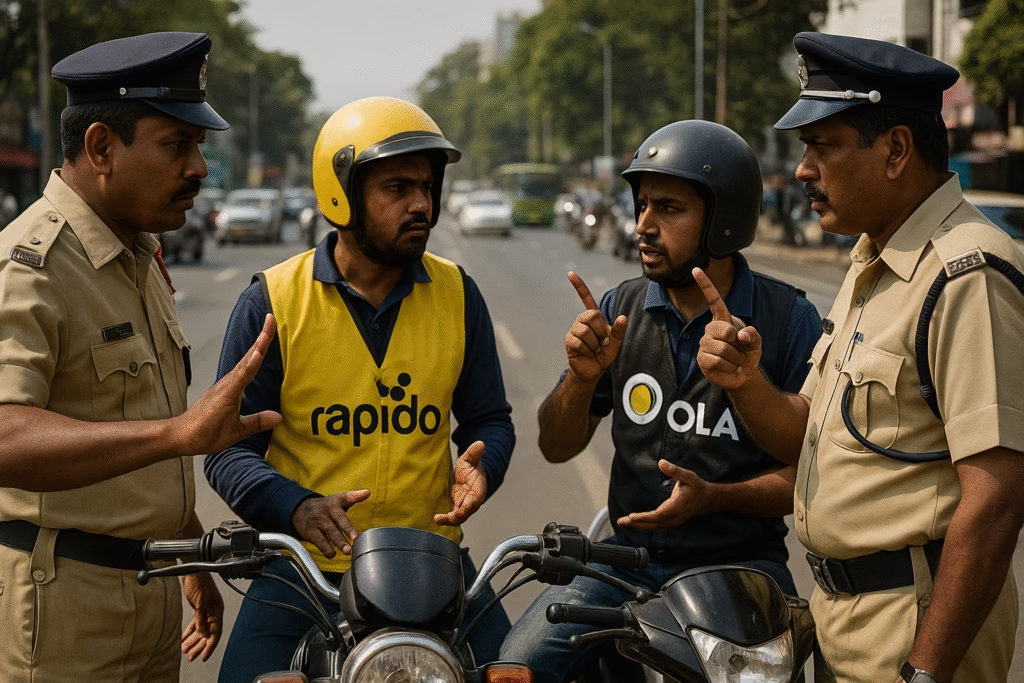
Bike Taxi Ban
Bike Taxi Ban in Karnataka: A Closer Look at the Impact and Reasons

Bike Taxi Ban in Karnataka has become a hot topic among daily commuters, gig economy workers, and policymakers alike. Recently, the Karnataka government has intensified its action against app-based bike taxi services like Rapido and Ola Bikes, citing legal, safety, and policy violations. But what does this mean for the thousands who depend on these affordable rides every day?
Why Did Karnataka Ban Bike Taxis?
The primary reason behind the ban is regulatory clarity. Karnataka’s transport department insists that using private two-wheelers for commercial purposes is illegal under the Motor Vehicles Act. Unlike auto-rickshaws and cabs, bikes are not classified as commercial transport vehicles in the state’s permit system.
Multiple High Court cases and petitions filed by bike taxi aggregators have tried to challenge this, but the state remains firm, prioritizing commuter safety and revenue accountability. Officials argue that such services often bypass necessary commercial permits, insurance norms, and safety checks, exposing riders and pillion passengers to higher risk.
How Will This Ban Affect Daily Commuters?
Bike taxis gained immense popularity in cities like Bengaluru because they offer a cheap and swift alternative to four-wheelers stuck in traffic jams. For thousands of students, office goers, and even delivery staff, the ban means increased dependence on autos and cabs, which are costlier and sometimes less efficient during peak hours.
Commuters express concerns that this move could worsen last-mile connectivity issues and push people to use unauthorized bike taxis or unregulated local alternatives. Public transport, while affordable, is not always reliable or timely for short trips.
What About the Riders and Gig Workers?
The gig economy in Karnataka heavily relies on flexible jobs like bike taxis and food delivery. Many young riders work with companies like Rapido and Ola Bikes to supplement their incomes or as full-time earners. The ban directly impacts their livelihood. Riders now face fines, vehicle seizures, and harassment during daily operations.
Several rider associations and gig worker unions have demanded a clearer policy framework rather than an outright ban. They argue that with appropriate licensing and insurance, bike taxis can legally and safely operate, benefitting both riders and passengers.
What Do Companies Like Rapido and Ola Say?
Companies like Rapido have consistently claimed they operate within the legal framework and offer a much-needed solution for urban transport. They argue that their services fill a critical gap left by underdeveloped public transport and that they provide income opportunities to thousands of youth.
Rapido has approached the courts multiple times and has requested the government to introduce a proper licensing policy for bike taxis instead of banning them outright. Similar sentiments have been echoed by Ola Bikes, which has faced crackdowns in other states too.
Public Opinion: Divided But Concerned
On social media and local forums, opinions remain divided. Many commuters empathize with gig workers and feel the ban is a step backward, especially in cities where last-mile connectivity remains a problem. However, others support the government’s focus on road safety and regulation, pointing to incidents of misuse and harassment involving unauthorized bike taxi rides.
Future of Bike Taxis in Karnataka
Despite the ban, experts believe there’s still hope for a regulated bike taxi market. States like Telangana and Rajasthan have experimented with licensing norms for bike taxis, setting a possible precedent for Karnataka to follow.
Transport experts urge policymakers to recognize the demand for low-cost, flexible transport solutions in congested cities. With clear guidelines, insurance, and permit structures, bike taxis could operate safely while boosting the gig economy and reducing urban congestion.
Possible Alternatives for Commuters
In the short term, commuters are advised to rely more on metro trains, buses, and share autos for cost-effective travel. Several tech startups are exploring electric cycles and shared scooters as alternatives, which might not face the same legal challenges as motorbikes.
Local cab aggregators are also offering more discounted short-trip options to cover the gap left by banned bike taxis.
Government’s Next Steps
The Karnataka government has indicated it is open to discussions with stakeholders to draft a new policy. Recent statements suggest that instead of a blanket ban, the state might consider a licensing framework, but with strict rules on vehicle fitness, driver verification, and passenger safety.
Policymakers are under pressure to balance urban mobility needs with legal compliance and public safety.
Expert Opinions on Bike Taxi Ban
Urban transport researchers argue that bans alone rarely solve urban mobility challenges. Instead, integrated solutions involving technology, strong regulation, and public transport improvements are needed. Many suggest Karnataka could adopt a pilot project with limited bike taxi permits to test safety and regulatory measures before scaling up.
Conclusion: A Need for Balance
The Bike Taxi Ban in Karnataka has opened up a debate on the future of urban transport and gig work. While the intent to ensure legal compliance and safety is valid, thousands of livelihoods and commuter convenience hang in the balance. A modern city needs flexible and diverse mobility options; with proper policies, bike taxis can be part of that solution rather than being sidelined entirely.
As this issue evolves, commuters and gig workers should stay updated through official transport department notices and trusted local news outlets like Trendy India News.
For more related updates on Karnataka Transport Policy and Gig Economy News, follow our latest articles and daily news alerts.
About The Author
Discover more from Trendy India News
Subscribe to get the latest posts sent to your email.






